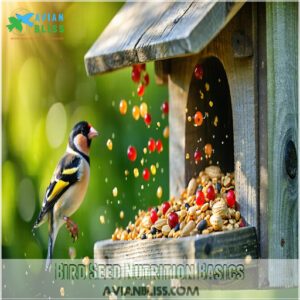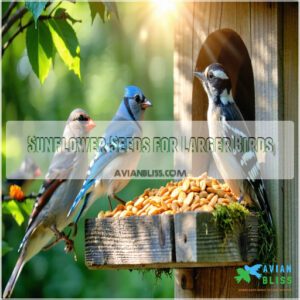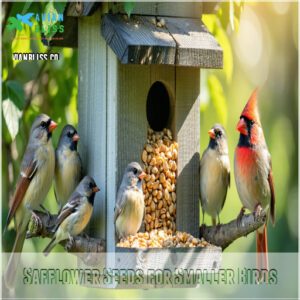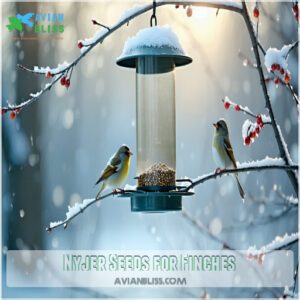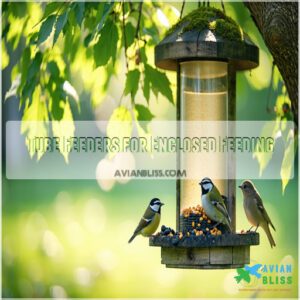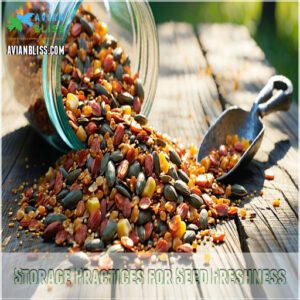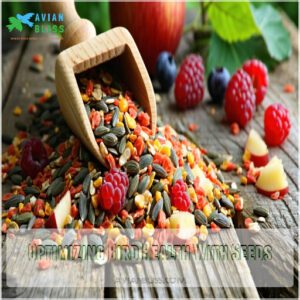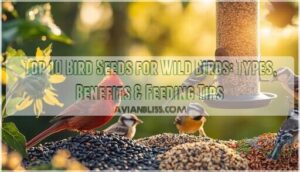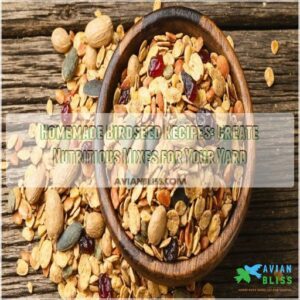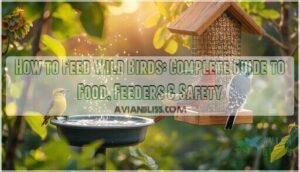This site is supported by our readers. We may earn a commission, at no cost to you, if you purchase through links.
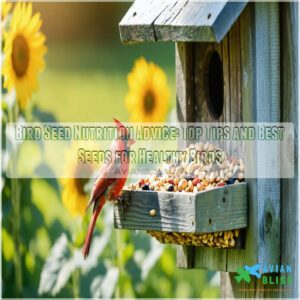
Protein and fat in seeds like sunflower and peanuts fuel energy and muscle growth, while carbohydrates from millet or corn provide that quick energy boost.
Fiber keeps digestion running smoothly, so it’s like a mini workout for their gut.
Don’t forget calcium for strong bones (or eggs!) and vitamins like A and D3 for shiny feathers.
Different species prefer different seeds—finches love nyjer, while larger birds favor sunflower.
Mix it up for variety, and always keep seeds fresh, and stay curious about feeder tips.
Table Of Contents
- Key Takeaways
- Bird Seed Nutrition Basics
- Choosing Right Bird Seeds
- Top 10 Bird Seed Options
- 1. Wagner 25 lb Black Oil Sunflower Bird Seed
- 2. Lyric No Waste Sunflower Wild Bird Seed 25 lb
- 3. Kaytee 5lb Striped Sunflower Bird Seed
- 4. Wagner 62050 10 Pound Nyjer Seed Bird Food
- 5. Droll Yankees Finch Flocker Bird Feeder 36 Inch
- 6. Wagner 57075 Safflower Seed Wild Bird Food
- 7. Wagner 18542 10 Pound Cracked Corn Wild Bird Food
- 8. Lyric No Waste Wild Bird Seed Peanut Pieces
- 9. Wagner 62059 Wild Bird Food Variety Blend
- 10. Wagner Songbird Supreme Wild Bird Food 8lb
- Bird Feeder and Seed Storage
- Optimizing Bird Health With Seeds
- Frequently Asked Questions (FAQs)
- What is the 5 7 9 rule for bird feeders?
- What is the healthiest thing to feed birds?
- What is the most critical nutrient to birds?
- Do wild birds recognize humans who feed them?
- How do you prevent mold in bird seed?
- What seeds attract hummingbirds to feeders?
- Can bird seed harm pets or wildlife?
- How to reduce waste from spilled bird seed?
- Are sprouted seeds healthy for wild birds?
- Conclusion
Key Takeaways
- Mix up seeds to provide a variety of nutrients like protein, fats, and carbohydrates for healthy, energetic birds.
- Avoid cheap seed mixes with fillers like red millet that birds won’t eat, and stick to high-quality seeds like sunflower or safflower.
- Store seeds in airtight containers in a cool, dry spot to prevent mold, pests, and spoilage.
- Add fresh fruits and vegetables to your birds’ diet to boost vitamins and keep their meals balanced.
Bird Seed Nutrition Basics
Birds need the right mix of protein, fat, and carbohydrates to stay healthy and energetic.
When you understand what each nutrient does, you can pick seeds that give birds the fuel and nutrients they need.
Importance of Protein and Fat
Protein and fat are the power duo of bird seed nutrition, fueling both muscle growth and endless energy.
Birds prioritize easily handled seeds for efficient consumption.
Seeds like black oil sunflower and peanuts pack lots of protein, perfect for feather strength and Avian health.
Their high fat content helps birds stay warm during winter, making high-energy bird food a crucial choice for providing the nutritional value birds need, making you a backyard hero.
Role of Carbohydrates and Fiber
Adding fats and protein is great, but don’t forget carbohydrates and fiber! They’re like a bird’s morning coffee, fueling energy and supporting digestion.
Carbs bring quick power, while fiber keeps everything running smoothly.
Seeds like millet, corn, and safflower pack these nutrients.
- Fuel essential energy needs
- Support healthy bird digestion
- Provide nutrient balance
- Boost birdseed nutrition
- Increase overall nutritional value
Vitamins and Minerals for Bird Health
To keep your feathered friends thriving, focus on bird nutrition with the right vitamins and minerals.
Calcium needs support strong bones and eggs, while mineral supplements, like cuttlebones, boost overall bird health.
Vitamins A, D3, and E improve feather health and prevent vitamin deficiency.
B-complex vitamins are important for essential nutrient breakdown.
Providing seeds, fresh fruits, and veggies maximizes nutritional value, ensuring your birds stay vibrant and healthy year-round with a balanced diet and proper care.
Choosing Right Bird Seeds
Picking the right bird seed isn’t tricky if you know what birds like and need.
Focus on seeds like sunflower for larger birds, safflower for smaller ones, and Nyjer for finches to keep your feathered friends healthy and happy.
Sunflower Seeds for Larger Birds
Sunflower seeds are a top choice for larger birds. Black oil sunflower, with its high energy bird food profile, is packed with fats and easy-to-crack shells, while striped sunflower suits tougher-beaked species.
Offering Sunflower Nutrition keeps them coming back! Consider bulk buying options to save money.
- Bird favorites: Cardinals, jays, woodpeckers
- High energy: Perfect for colder months
- Effortless cleanup: Hulled sunflower seeds
- Versatile feeders: Tube, hopper, or tray-friendly
Safflower Seeds for Smaller Birds
Safflower seeds are a smart choice for those seeking healthy bird food options.
Packed with fat and protein, they boost bird seed nutritional value and attract species like cardinals, chickadees, and titmice.
Their natural bitterness and tough shells keep squirrels and bully birds away.
You can find a variety of safflower seed products online.
For feeding tips, introduce them gradually, as some birds need time to adapt, and they’re also very tidy, with no mess!
Nyjer Seeds for Finches
Nyjer seed is a finch favorite, offering unbeatable bird seed nutritional value.
These tiny black seeds pack protein and healthy fats, perfect for finch diets.
Specialty nyjer seed finch products are available for purchase.
Their small size works best in specialized feeder designs with tiny ports, suiting finch behavior while keeping sunflower-loving birds out.
For seed storage, use airtight containers to maintain freshness.
Nyjer benefits include easy feeding, less refilling, and happy, healthy bird food choices, making it a great option for those who want healthy bird food.
Top 10 Bird Seed Options
You’ve got plenty of bird seed options, but not all are created equal.
Let’s look at the top 10 seeds that offer the best nutrition and help attract a variety of birds to your yard.
1. Wagner 25 lb Black Oil Sunflower Bird Seed
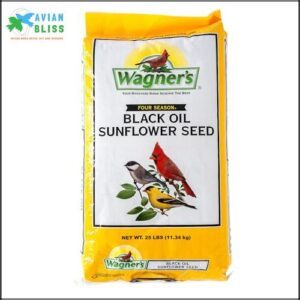
If you want a seed that birds flock to, Wagner’s 25 lb Black Oil Sunflower Bird Seed is a top choice.
Packed with high energy and a thin shell, it’s easy for small-beaked birds like chickadees and finches to crack.
This seed attracts cardinals, jays, titmice, and more, making it a hit for bird enthusiasts.
The large bag is budget-friendly, but some bags have excess debris, which might clog feeders.
Store in a dry, secure container to keep it fresh and effective.
Best For: Bird enthusiasts looking to attract a wide variety of bird species with a high-energy, affordable seed option.
- Attracts a wide variety of birds like cardinals and chickadees.
- Thin shell makes it easy for small-beaked birds to eat.
- Large bag provides good value for the price.
- Some bags contain excessive debris that may clog feeders.
- No velcro closure on the 25 lb bag.
- Quality inconsistency noted in recent batches.
2. Lyric No Waste Sunflower Wild Bird Seed 25 lb
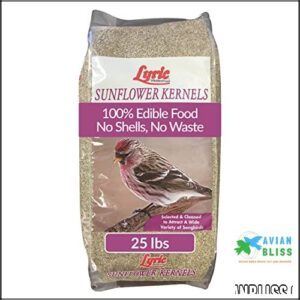
Lyric No Waste Sunflower Wild Bird Seed is a premium choice that keeps things clean and simple.
It’s 100% edible, so there’s no shell mess cluttering your yard. Packed with protein and fat, this seed fuels birds’ energy year-round.
Its pre-hulled kernels make it ideal for various feeders, from tubes to platforms. You’ll attract a colorful crowd—think chickadees, cardinals, finches, and more.
While it’s pricier than some options, the quality and zero-waste feature might be worth every penny. Pro tip: squirrels love it too!
Best For: Attracting a wide variety of colorful songbirds while keeping feeding areas clean and mess-free.
- 100% edible with no shell waste.
- High protein and fat content for year-round bird health.
- Works with various feeder types, including tube and platform.
- Higher cost compared to other bird seeds.
- Attracts squirrels and other unwanted animals.
- Price fluctuations may make it less budget-friendly.
3. Kaytee 5lb Striped Sunflower Bird Seed
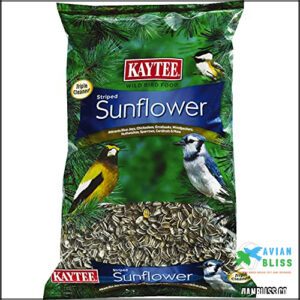
Packed with energy, Kaytee’s 5lb Striped Sunflower Bird Seed is perfect for larger birds like blue jays, woodpeckers, and cardinals.
These seeds are rich in oil, giving birds the energy they need while keeping them healthy.
Cleaned to reduce debris, this seed helps avoid mess in your feeders. Just remember to reseal the bag and store it in a cool, dry spot to keep it fresh and insect-free.
It’s high-quality seed that birds love, though some prefer other treats!
Best For: Bird enthusiasts looking to attract larger birds like blue jays, woodpeckers, and cardinals with high-energy, nutrient-rich seeds.
- High-energy seeds rich in oil for bird health.
- Cleaned to reduce mess and debris.
- Appeals to a wide range of larger birds.
- Packaging is not resealable.
- Some birds may prefer alternative food options.
- Requires careful storage to maintain freshness.
4. Wagner 62050 10 Pound Nyjer Seed Bird Food
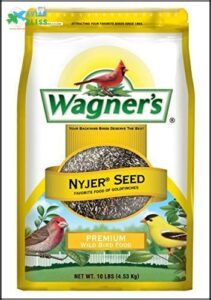
For feeding finches, Wagner’s 62050 Nyjer Seed is like hitting the jackpot.
This 10-pound bag packs high-energy, clean seeds, perfect for goldfinches, purple finches, and pine siskins.
With 150,000 tiny seeds per pound, your feeders will stay busy for hours.
The velcro press-lok bag makes storage easy while keeping seeds fresh.
Use a finch feeder with small ports to avoid waste.
Bonus? Nyjer seeds rarely sprout, so there’s no yard mess, making it a small seed with huge bird appeal!
Best For: Finch enthusiasts looking for a high-energy, mess-free seed that attracts goldfinches, purple finches, and pine siskins.
- High-energy, clean seeds attract finches.
- Velcro press-lok bag keeps seeds fresh and easy to store.
- Low waste with seeds that rarely sprout.
- Requires specific finch feeders with small ports.
- Limited to birds that prefer nyjer seeds.
- May not deter larger, unwanted bird species.
5. Droll Yankees Finch Flocker Bird Feeder 36 Inch
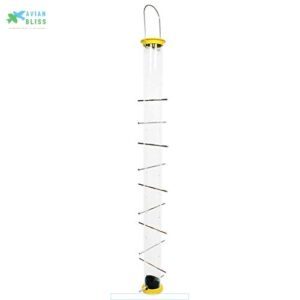
The Droll Yankees Finch Flocker bird feeder is like a buffet for finches!
With 20 feeding ports and a 3.5-pound capacity, it’s built to keep your feathered friends happy.
Its UV-stabilized polycarbonate tube and die-cast metal parts make it tough against squirrels and weather.
The internal baffle guarantees seed doesn’t get stuck, while drainage holes keep everything fresh.
You can hang it or pole-mount it, making it versatile.
Just remember, patience matters—some birds need time to discover it!
Best For: Birdwatchers aiming to attract finches and other small birds with a durable, high-capacity feeder.
- Durable construction with UV-stabilized polycarbonate and metal parts.
- 20 feeding ports allow multiple birds to feed simultaneously.
- Internal baffle and drainage holes keep seeds fresh and prevent clogging.
- May require time for birds to discover and use it.
- Does not completely prevent damage from larger animals like black bears.
- High price point compared to simpler feeders.
6. Wagner 57075 Safflower Seed Wild Bird Food
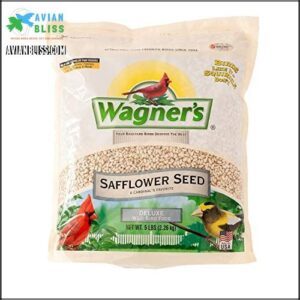
Wagner 57075 Safflower Seed Wild Bird Food is perfect for attracting cardinals and other songbirds while keeping squirrels at bay.
With a high fat content, it’s nutritious and ideal for smaller birds. Safflower’s taste often deters pests, like starlings or house sparrows.
Switching to safflower? Start slow, mixing with existing seeds. Use hopper or platform feeders for best results.
It’s found in many gourmet blends, offering premium quality. Learn more about safflower seed benefits.
Storage matters—use airtight containers to maintain freshness and avoid spoilage. Satisfaction’s guaranteed!
Best For: Attracting cardinals and other songbirds while deterring squirrels and pests like starlings.
- Nutritious, high-fat safflower seed preferred by many songbirds.
- Often disliked by squirrels and nuisance birds.
- Premium quality, found in many gourmet seed blends.
- Birds may take time to discover the seed.
- Requires storage in airtight containers to maintain freshness.
- Limited appeal to larger or ground-feeding birds.
7. Wagner 18542 10 Pound Cracked Corn Wild Bird Food
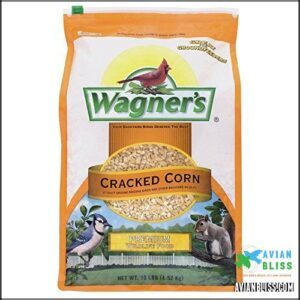
If you’re after cracked corn for ground-feeding birds, Wagner 18542 Cracked Corn Wild Bird Food is a great pick.
It attracts cardinals, juncos, quail, and even ducks.
You can mix it with other seeds or feed it separately to keep squirrels busy.
Just keep it dry—moisture can cause mold.
Many birds and critters love it, but the bag isn’t resealable, so plan storage carefully.
Best For: Ground-feeding birds like cardinals, juncos, quail, ducks, and other wildlife enthusiasts.
- Attracts a wide variety of ground-feeding birds and wildlife.
- Can be fed alone or mixed with other seeds.
- Affordable option for feeding birds and wildlife.
- Bag is not resealable, requiring careful storage.
- Can be messy to use.
- Some users report mixed kernel quality and dust content.
8. Lyric No Waste Wild Bird Seed Peanut Pieces
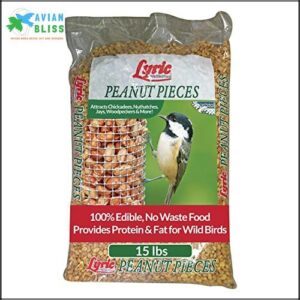
Lyric No Waste Wild Bird Seed Peanut Pieces is a game-changer for attracting birds.
These split, shelled peanuts are 100% edible, meaning no messy shells left behind.
Packed with protein and fat, they’re perfect for fueling birds’ energy needs year-round.
Use them in tube feeders, wire mesh feeders, or open platforms to welcome bluebirds, chickadees, buntings, and woodpeckers.
Plus, the stay-fresh technology keeps peanuts from spoiling.
Just remember, mold might form if it rains, so keep feeders dry for happy, healthy birds, using no messy shells and providing a perfect fuel.
Best For: Bird enthusiasts who want a no-waste, high-nutrition food for attracting diverse songbirds year-round.
- 100% edible peanuts reduce mess and waste.
- High-protein and fat content fuels birds’ energy needs.
- Compatible with multiple feeder types, attracting various songbird species.
- Mold can form if exposed to rain.
- Not all feeder types work with peanuts.
- Over-roasted or color preferences may limit some birds’ interest.
9. Wagner 62059 Wild Bird Food Variety Blend
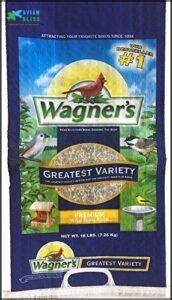
If you’re looking to attract a variety of birds, this mix is a jackpot.
With 11 ingredients, including 40% sunflower seeds, it pulls in cardinals, chickadees, finches, and more.
It’s great for tube, hopper, or platform feeders and works for birds of all sizes.
Just watch out for moisture—mold can be an issue, so store it in airtight containers.
The blend’s variety appeals to many species, making backyard birdwatching a breeze, and it’s made in the USA with satisfaction guaranteed!
Best For: Backyard bird enthusiasts looking to attract a variety of species with a mix of high-quality seeds.
- Attracts a wide variety of birds, including cardinals, finches, and woodpeckers.
- Can be used with tube, hopper, or platform feeders.
- Made in the USA with a satisfaction guarantee.
- Moisture can cause mold issues if not stored properly.
- Some customers report clumping and poor seed quality.
- Occasional complaints about delayed delivery.
10. Wagner Songbird Supreme Wild Bird Food 8lb
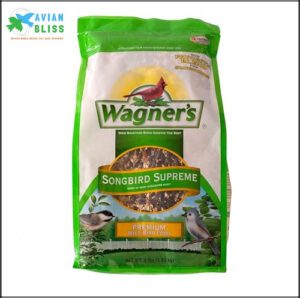
If you want to keep birds coming back, this 8lb Songbird Supreme mix packs a punch.
With 50% sunflower seeds and other premium ingredients, it’s a buffet for cardinals, chickadees, and even woodpeckers. You can use tube, hopper, or platform feeders—versatile, right?
Its reclosable bag makes storage easy. Just remember, hungry birds mean you’ll refill often, especially in winter.
Oh, and don’t be surprised if squirrels join the feast—they love sneaking fallen seeds! Keep it stored dry to maintain freshness and ensure the birds keep coming back for this buffet.
Best For: Bird enthusiasts looking to attract a wide variety of songbirds with a high-quality seed blend.
- Contains 50% sunflower seeds, a favorite for many birds.
- Versatile usage with tube, hopper, or platform feeders.
- Reclosable bag ensures easy storage and freshness.
- Requires frequent refilling during colder weather.
- Can attract squirrels to fallen seeds.
- Seasonal variation in bird species attracted.
Bird Feeder and Seed Storage
You need the right feeder to protect bird seed from moisture and pests, so tube feeders are a great option.
Store your seed in an airtight container in a cool, dry spot to keep it fresh and safe for your feathered visitors.
Tube Feeders for Enclosed Feeding
Tube feeders are like snug diners for birds, keeping snacks safe and fresh. These feeders shield seeds from rain, reducing mold and rot.
You can find a variety of best tube bird feeders online.
Here are five bird feeding tips for tube feeders:
- Use feeders with multiple feeding ports to reduce crowding.
- Look for tube designs that protect seed from moisture and pests.
- Clean regularly for feeder maintenance and bird health.
- Choose models that limit access by squirrels for better seed protection.
- Pair with healthy bird food choices, like a quality bird seed mix.
Tube feeders help maintain bird seed nutrition while attracting feathered guests. They are designed to provide a safe and fresh environment for the birds, with features that protect the seed from moisture and pests. By following these tips and using the right tube feeders, you can create a healthy and enjoyable experience for the birds.
Storage Practices for Seed Freshness
Keeping bird seed fresh is essential for happy, healthy birds.
Store seeds in a cool, dry location, away from sunlight. Airtight containers are your best friend—they prevent bird seed spoilage by keeping out moisture and pests.
For ideal storage, consider these bird food storage container recommendations. Got an old freezer or garage? Those work great, as long as they’re dry.
Regularly check for mold or a musty smell—those are freshness maintenance red flags!
| Tip | Why | How |
|---|---|---|
| Cool, Dry Location | Prevents spoilage | Use a basement or pantry |
| Airtight Containers | Blocks pests and moisture | Glass or plastic bins |
| Rotate Stock | Keeps seeds fresh | Use oldest first |
| Check Weekly | Avoids moldy surprises | Inspect for clumps/smell |
Optimizing Bird Health With Seeds
You can keep birds healthy by offering a variety of seeds that provide the right balance of protein, fat, and carbohydrates.
Don’t forget to skip cheap fillers and add fresh fruits or vegetables for extra nutrients.
Providing Balanced Diet With Variety
Mixing up a bird’s meals keeps them healthy and happy. A balanced diet with seed variety matches bird preferences and their dietary needs.
Birds love nutrient-rich options, so aim for high nutritional value. Consider a premium ready-made mix for balanced nutrition.
Include these in your feeding strategies:
- Sunflower seeds for energy.
- Nyjer seeds for finches.
- Safflower seeds for smaller birds.
- Millet for ground feeders.
- A quality bird seed mix.
Avoiding Cheap Filler Ingredients
Cheap filler ingredients like red millet and oats might save money, but they mess with bird seed nutrition. Birds often ignore fillers, leaving a wasteful mess.
Prioritize quality bird food with no fillers to maintain nutrient balance. Here’s an easy guide:
| Seed Quality | Filler Effects | Healthy Options |
|---|---|---|
| High-nutrition | Ignored by birds | Sunflower seeds |
| Fewer fillers | Wasteful mess | Safflower seeds |
| Premium mixes | Poor digestion | Nyjer seeds |
Choose wisely for bird digestion to ensure the best outcome, and remember that quality bird food is essential for their health.
Supplementing With Fresh Fruits and Vegetables
Adding fresh fruit and vegetables to your bird’s diet gives a powerful nutrient boost and balances nutritional imbalances.
These healthy treats complement seed supplements and enrich their avian diet with essential vitamins.
- Fresh Fruit Benefits: Chop apples, bananas, or berries for an easy snack.
- Vegetable Variety: Offer spinach, carrots, or peas.
- Healthy Diet Hint: Rotate foods to keep bird nutrition interesting and balanced.
Frequently Asked Questions (FAQs)
What is the 5 7 9 rule for bird feeders?
Think of the 5-7-9 rule as a “height spotlight” for feeders: hang feeders 5 feet above ground, place them 7 feet from cover, and keep at least 9 feet from potential predator hiding spots.
This rule can be broken down into three main parts: the height at which feeders are hung, the distance from cover, and the distance from potential predator hiding spots.
What is the healthiest thing to feed birds?
The healthiest bird food combines high-fat sunflower seeds, protein-rich peanuts, and fresh fruits.
Balance their diet with calcium sources like eggshells or cuttlebones.
Avoid cheap seed mixes full of filler grains birds won’t eat, and opt for a diet that includes high-fat sunflower seeds.
What is the most critical nutrient to birds?
Protein is the most critical nutrient for birds.
It fuels feather growth, muscle repair, and energy needs.
Without enough protein, birds can’t grow strong or stay healthy, leaving them vulnerable in harsh weather or migration.
Do wild birds recognize humans who feed them?
Birds have sharp memories—like recognizing landmarks, they often remember you as their food source.
If you feed them consistently, they’ll associate you with safety and snacks, observing you closely and even learning your routine, which can lead to them remembering you as a food source.
How do you prevent mold in bird seed?
Keep bird seed dry by using feeders with drainage holes and placing them in sheltered spots.
Store seed in airtight containers in a cool, dry place.
Check often and toss moldy seed—birds hate spoiled snacks!
What seeds attract hummingbirds to feeders?
Hummingbirds don’t flock to seeds; they prefer nectar-like foods.
A sweet homemade mix of sugar and water in feeders mimics flower nectar.
Skip seeds—focus on sugar water (1 part sugar, 4 parts water).
Can bird seed harm pets or wildlife?
Yes, bird seed can harm pets or wildlife if it’s moldy, contains toxins like aflatoxins, or attracts animals like rats.
Keep seeds dry, secure, and avoid sharing flavored or salted nuts with pets.
How to reduce waste from spilled bird seed?
Place a tray under feeders to catch spills, use no-mess seed mixes like hulled sunflower, and sweep the area often.
Avoid overfilling feeders, and choose feeders designed to reduce scattering—simple steps to keep things tidy!
Are sprouted seeds healthy for wild birds?
Don’t throw the baby out with the bathwater—sprouted seeds pack a punch for wild birds.
They’re nutrient-rich, easier to digest, and full of energy.
But avoid moldy ones to keep feathered friends healthy.
Conclusion
Think of bird seed as the fuel that keeps your feathered friends thriving.
When you offer seeds rich in protein, fats, fiber, and essential vitamins, you’re ensuring their energy, gut health, and shiny feathers.
Mix sunflower for big birds, safflower for little ones, and nyjer for finches to keep everyone happy.
Avoid filler seeds, keep their diet varied, and store it fresh.
Follow this bird seed nutrition advice, and watch your backyard become a lively, healthy paradise.

